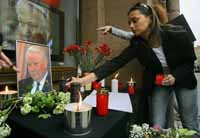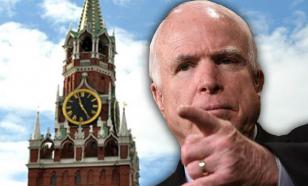Boris Yeltsin laid to rest at Moscow cemetery in symbolic ceremony
Former President Boris Yeltsin was laid to rest alongside writers, artists and another 20th century Russian leader, in a tradition-laden ceremony unprecedented for modern Russia.

Former U.S. Presidents George H. W. Bush and Bill Clinton and former British Prime Minister John Major joined foreign dignitaries at church services and a funeral procession through Moscow's streets Wednesday to the landmark Novodevichy Cemetery, paying respects to Yeltsin during a day of mourning and symbolism.
"The whole dramatic history of the 20th century was reflected in the fate of Boris Nikolayevich," Russian Orthodox Patriarch Alexy II wrote in a letter that was read aloud during services at the Cathedral of Christ the Savior. "Being a strong individual, he took upon himself responsibility the fate of the country at a difficult and dangerous time of radical change."
Yeltsin's anointed successor - Vladimir Putin - played a low-key role, attending the church service and marching with his wife Lyudmila in the burial procession. At a Kremlin reception hours after the burial, he promised to pursue his predecessor's goals.
"He sincerely tried to do everything to make the lives of millions of Russians better," Putin said. "We will move toward these goals.
"Having become president thanks to the support of millions of citizens of the country, he changed the face of power, tore down the blind wall between society and the state," he said.
Many mourners said they admired Yeltsin for breaking the grip of monolithic Communism and moving the country to pluralism - and said they fear his successor Putin is reversing the progress.
"I came here to pay respect to Boris Nikolayevich for everything he has given us: freedom and the opportunity to realize ourselves," said 73-year-old Svetlana Zamishlayeva. But now, "there is a certain retreat from freedom of the press, from fair elections, from all kinds of freedom."
Before the burial, more than 20,000 people filed through the gold-domed cathedral, which is the site of the Orthodox Church's most important services, to view Yeltsin's body.
Following an 85-minute ceremony that echoed with priests' chanting and a choir singing funeral liturgy, the coffin - draped in the Russian tricolor - was driven in a black Mercedes hearse on a winding 7 kilometer (4-mile) procession through the city center and along the Moscow River.
An armored military truck then drew the army-green caisson the final steps to Novodevichy along a carnation-strewn lane, escorted by an goose-stepping honor guard and a crowd of foreign dignitaries and church leaders.
With the coffin resting on a metal cart that resembled a hospital gurney and suggested perhaps some of the ceremony's improvisation, Yeltsin'stearfulwidow Naina - dressed in a black dress and scarf - stroked his shock of white hair and tenderly kissed his forehead and cheeks. White-robed Orthodox priests chanted prayers and swung censers before pallbearers closed the coffin and lower it into the ground.
All major Russian television channels broadcast live from the cathedral, the funeral procession and the cemetery burial, which culminated in an artillery fusillade and the playing of the Russian national anthem.
Yeltsin, who died of heart failure Monday at age 76, pulled the country out from the Soviet Union and pushed it into a fitful democracy, seeking to inject pluralism and vigor to Russia after decades of Communist repression and stagnation.
The first freely elected president of Russia, Yeltsin was admired for opposing the 1991 hard-line coup attempt but derided for his heavy drinking and despised for allowing insiders to snap up Russia's industrial gems while millions of his countrymen plunged into poverty.
"Fate has decreed that Russian liberators often are not understood _ and are cursed by their people. But I think that history, and mainly time, will put everything in its place," Boris Nemtsov, a former deputy prime minister, said in comments to NTV.
The last state funeral held in Moscow was for the death of Communist Party chief Konstantin Chernenko in 1985. Yeltsin's funeral was improvised and, in many ways, unprecedented for Russia, where in the past century the country's leaders have been buried or interred in either aboveground church crypts in St. Petersburg or alongside the Kremlin walls or in a mausoleum on Red Square.
Nikita Krushchev is the only Soviet leader to be buried at Novodevichy, alongside writers Anton Chekhov and Mikhail Bulgakov and composers Sergei Prokofiev and Dmitry Shostakovich.
The day's events were also mixed with political symbolism _ the burial at Novodevichy, religious services for a nominally pious man in a cathedral restored during his presidency; the playing of the national anthem whose music is the same as the Soviet anthem.
As part of his crusade to rid Russia of Soviet trappings, Yeltsin banned the Soviet anthem and replaced it with a tamer 19th century composition. Putin later returned the Soviet anthem's music asthe Russian national hymn.
The emotions Yeltsin inspired were also on display in the lower house of parliament Wednesday where Communist lawmakers in the State Duma refused to stand for a moment of silence called in his memory. Communist deputy Mikhail Zapolev suggested "hammering an aspen stake" into Yeltsin's grave, according to ITAR-Tass.
And in what could be perceived as yet another snub for Yeltsin, the Duma voted to return the hammer-and-sickle to a Red Army banner that hung over the Reichstag in Berlin in the waning days of World War II.
Subscribe to Pravda.Ru Telegram channel, Facebook, RSS!




